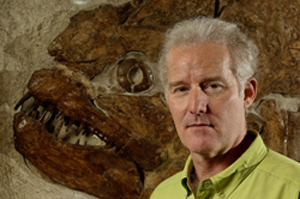
Professor Timothy Rowe
Prof. Rowe is a paleontologist who specializes in the vertebrate skeleton in all its forms, from fossils to
Recent species, and from embryos to adults. His research encompasses the
theory and application of phylogenetic systematics, which he uses to
explore co-evolution of the vertebrate genome and phenome. He is also a
leader in developing and exploiting digital tools that augment and
extend our ability to analyze and visualize the skeleton along with the
‘soft’ tissues that the skeleton supports.
Rowe joined the University of Texas faculty in 1986, after earning an AB
degree (Geology major, with minor emphasis in Biology) from Occidental
College (1975), an MS (Anatomy) from the University of Chicago (1981),
and a PhD (Paleontology) from the University of California, Berkeley
(1986). Rowe was awarded a prestigious Thomas J. Watson Fellowship which
enabled him to train for a year in major natural history museums in
Europe and South Africa (1975-1976). He served for three years as Senior
Paleontologist at the Museum of Northern Arizona in Flagstaff
(1978-1981), where he began a life long field program in the American
Southwest. Rowe was a Fellow in Residence at the National Museum of
Natural History of the Smithsonian Institutions (1983-1984), and became the
first paleontologist ever awarded a Presidential Young
Investigator Award by the National Science Foundation, in recognition of
his innovative integration of digital technologies for studying the
evolution of development (1989-1994).
Rowe was the Founding Director of the Center
for Instructional Technologies (1996-1997). In 1997, together with
Prof. William Carlson, Rowe founded
the High Resolution X-ray Computed Tomography Facility (UTCT), which he
and Carlson jointly direct along with Prof. Richard Ketcham. UTCT
is now an NSF Multiuser Facility. As a
member of that facility Rowe also founded the award winning wesite
"Digital Morphology." Since 1998, Prof. Rowe has been
Director of the Vertebrate Paleontology Laboratory, which holds one of
the largest research collections of vertebrate fossils in America.
Dr. Rowe’s research and training efforts have been funded by the
National Science Foundation continuously since 1985. He was also granted
research awards by the W. M. Keck Foundation, the Intel Foundation, the
National Chemical Society, and the Texas Advanced Technologies Program.
Prof. Rowe teaches undergraduate courses in paleontology and has
maintained a graduate research training program that is among the
largest in the nation. His students have become experts in vertebrate
morphology, systematics, development, and informatics. Rowe has also
served on graduate committees in the UT School of Biology, the School of
Information, and in the Butler School of Music.
Dr. Rowe is also an expert in public policy pertaining to
paleontological resources, and he has served as an expert witness in
judicial proceedings involving fossils. He also an expert in exhibit
design and has directed and consulted in several major fossil
exhibitions.
Field research is an important component of Prof. Rowe’s research
interests. He has conducted field work in Mexico, Europe, and South
Africa, but his specialty is the American Southwest, where he has worked
in Permian, Triassic, Jurassic, Cretaceous, and Cenozoic terrestrial
deposits from across the region.
Today Prof. Rowe continues to direct a rigorous program in undergraduate
and graduate training, and accepts new graduate students every year. His
research specializes on the evolution of the vertebrate brain and
sensory systems, and on the Permo-Mesozoic faunas of the Western
Interior. He also continues aggressive efforts to advance digital
technologies in support of his research and teaching, and in support of
the large fossil collection he maintains.